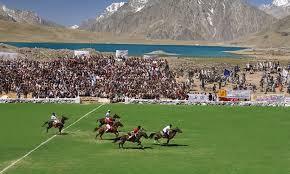
https://www.sportanddev.org/latest/news/shandur-polo-festival-world%E2%8...
The Shandur Polo Festival is held every July at Shandur Pass (at an altitude of approximately 3,700 meters) at the junction of Gilgit-Baltistan and Chitral, Pakistan, and is rightly called the "World's Highest Polo Festival." The three-day festival is not only a sporting competition but also a rich cultural celebration, where local music, folk dances, traditional polo competitions, horse parades, and the participation of thousands of tourists make this event a global standout.
Historical roots of polo
Polo is a centuries-old tradition in the region. Historical evidence suggests that polo originated in Central Asia and spread to Gilgit, Chitral, and Ladakh, where it was known as the "Game of Kings." In Chitral and Gilgit, polo is not just a sport but an important part of cultural identity. People here learn to play polo from an early age, and horse training in the traditional way is part of their daily lives.
Indigenous communities
The area is primarily inhabited by indigenous peoples, including the Khow people of Chitral and the Shina and Brushaski-speaking tribes of Gilgit-Baltistan. These communities have inhabited these valleys for at least a thousand years and have maintained their economy through livestock rearing, agriculture, and traditional crafts. The presence of these indigenous people and their culture, passed down from generation to generation, make Shandur Polo not just a game but a living cultural heritage.
Features of the Shandur ground
The natural Shandur field—also known as "Shandur Top" by the locals—is spread out over lush pastures and the foothills of snow-capped mountains. The field has no artificial surface, making the game more dangerous and thrilling. This is why Shandur Polo is so attractive to spectators.
Rules of the game and participating teams
Shandur Polo is a traditional "freestyle polo," which has fewer rules than international polo. In this game:
- Teams of six to ten players usually participate.
- There is no umpire; the captains of both teams are considered to be the guarantors of the game's integrity.
- The game consists of two halves of 25 minutes each.
- Fouls or other minor rules are not strictly enforced, which greatly increases the speed and intensity of the game.
- The most important competition is between the teams of Chitral and Gilgit, who take to the field with great enthusiasm to represent their honor and the region.
International importance and tourist attraction
The Shandur Polo Festival has now also gained recognition at the international level. Every year, tourists from Europe, America, China, and the Gulf countries come specifically to watch this unique game, which they cannot see anywhere else. They not only watch polo but also enjoy camping, fishing, hiking, and local folk music, which significantly boost the local economy.
Sport for development and peace
Linked to Sport for Development and Peace (SDP), the Shandur Polo Festival is also a practical manifestation of the principles of "Sport for Development and Peace." Through this festival:
- Different ethnic groups of Chitral and Gilgit, which have sometimes been at odds in the past, come together in an atmosphere of peace and brotherhood.
- Local youth are given a positive direction by engaging them in healthy activities.
- Sports foster social cohesion and the promotion of local culture.
Thus, Shandur Polo is not only a sport but also a means of development, peace, tourism, and the preservation of indigenous cultural heritage, which is especially valuable in an era when many parts of the world are suffering from hatred and intolerance.









